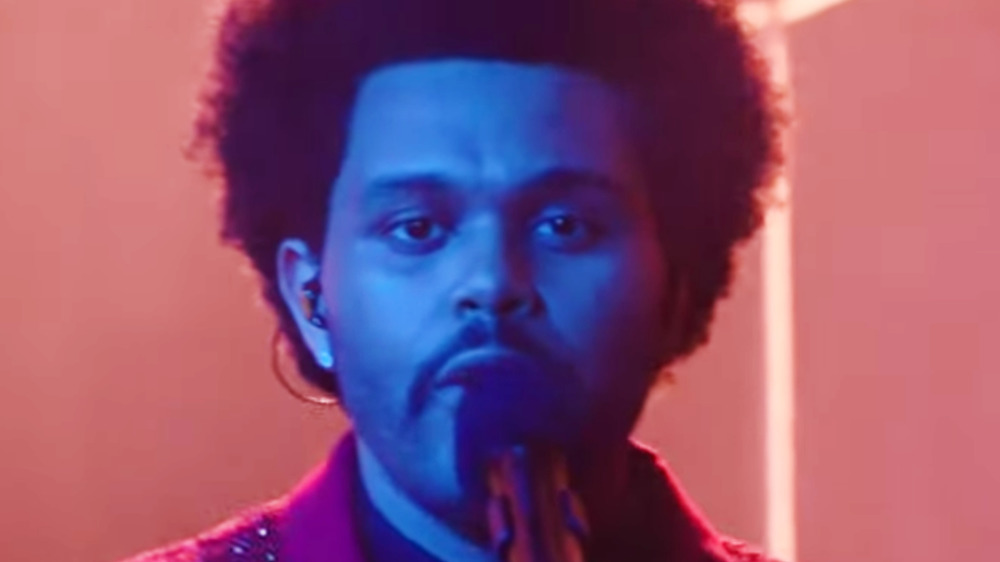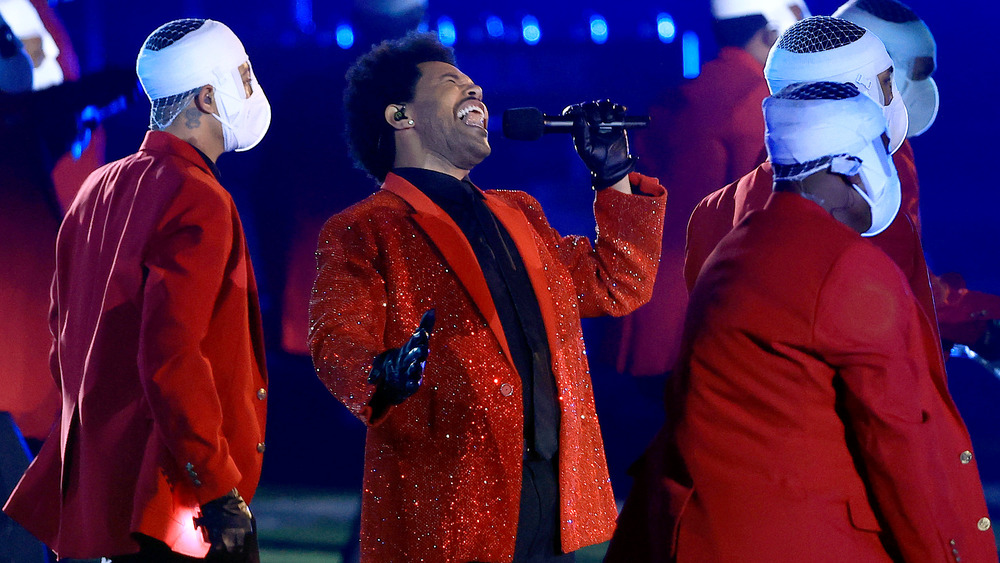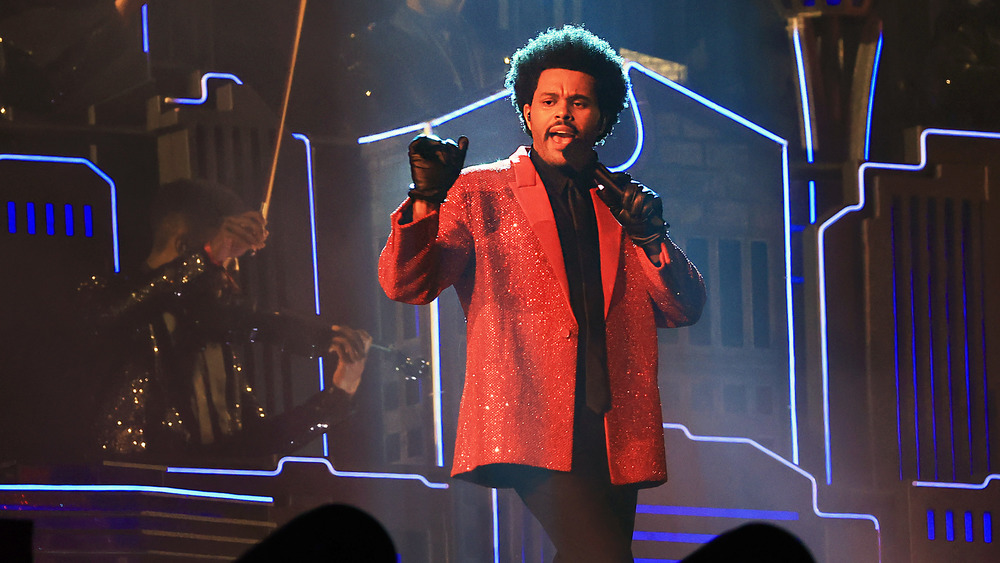The Odd Reason The Weeknd Is Trending After His Halftime Show
There are a lot of reasons the Weeknd would be a trending topic on social media after his spectacular and polarizing statement of a Super Bowl halftime show performance on Sunday, February 7. People could be talking about his creepy, Us-esque bandaged dancers that brought his grotesque, bloody-faced After Hours aesthetic to the biggest stage in America. Or they could be expressing their disappointment that Daft Punk didn't show up as special guests, as the robotic superstar French electronic music duo produced the Weeknd's hit songs "Starboy" and "I Feel It Coming," both of which he performed during the show. They could also be posting about how uncomfortable they felt during the Weeknd's dizzying jaunt into the gold room under the stage, or making memes out of the moments when the Weeknd appeared to be confused and looking for something.
To be clear, all of those topics were trending during and after Super Bowl Sunday. But they were all trending with and alongside "Abel." Those not in the know might see that and think, "Abel like Cain and Abel from the Bible? What does he have to do with football?" But no, that's not it: Abel is the Weeknd's real first name, and fans were talking about him very familiarly. Here's why.
The Weeknd started from the bottom, now he's here
To understand why people feel enough of a connection to the Weeknd to call him by his first name, you have to know the story of where he came from.
The Weeknd was born Abel Makkonen Tesfaye on February 16, 1990 in Toronto, Ontario, Canada. He was raised by his mother and grandmother, who are both immigrants from Ethiopia, in the city's Scarborough neighborhood. In his teenage years, Tesfaye lived a wayward lifestyle that still informs the lyrical content of his music. According to The New York Times, he lived in squalor, took whatever drugs he could get his hands on, and told women that he loved them in order to stay in their homes. Tesfaye adopted his stage name during this time; according to MTV, one weekend, he dropped out of school, left home, and never went back. Tesfaye later dropped the 'E' from his stage name to avoid copyright infringement with a band called the Weekend.
Tesfaye then got a job working at American Apparel, the coolest place a hip young person could work in the late '00s, and started really working on his music. He began with nothing but a dream, a drive, and a killer voice. People relate to him because he went through a lot of the same things they went through or are currently going through; fans calling him Abel rather than the Weeknd bridges the gap between the consumer and the artist, and creates a certain level of relatability and connection.
The House of Balloons era
The Weeknd's earliest releases came in 2010 — three songs that still sound amazing today: "The Morning," "What You Need," and "Loft Music," which became the backbone of his debut mixtape House of Balloons. He put music up online and let it spread through word of mouth and through rave reviews on hip music websites like Pitchfork, which gave House of Balloons a coveted Best New Music tag in 2011. The Weeknd built mystique by being anonymous: He didn't appear in promotional photos, and he didn't give interviews. People barely knew his name was Abel Tesfaye. It's hard to remember now, but early in his career, the Weeknd was a cult indie act people talked about in the same breath as half-forgotten artists like How to Dress Well.
The Weeknd went to the next level in 2015. His trilogy of early mixtapes turned him into a big enough star to be able to play arenas, but he felt like he was hitting a ceiling with the kind of music he was making. The Weeknd's major label debut, Kiss Land, underperformed, and he wanted his next album to make him one of the biggest stars in the world. And it worked: Beauty Behind the Madness made him into a superstar. At one point, his songs "I Can't Feel My Face," "The Hills," and "Earned It," occupied the no. 1, no. 2, and no. 3 slots on the Billboard Hot R&B chart.
He earned it
Since then, the Weeknd's star has only risen. Headlining the Super Bowl halftime show — which only the world's biggest artists get to do, artists like Prince, the Weeknd's idol – was a huge, well-deserved moment for the singer-songwriter. His ascent to the peak of stardom might not mean much to casual fans, and it means nothing to people who were unaware of him before Sunday night. But fans who have been following the Weeknd since House of Balloons look at where he came from and see where he is now, and they're ecstatic. They feel personally invested in his success, and they're proud of him. They've been with him since the beginning, so they feel like they've earned the right to call him Abel when they talk about him.
"When Abel did the lil house of balloons I was so excited that was a shout-out for us OG XO fans," tweeted Weeknd superfan @dj_dani_v, referencing XO, the Weeknd's record label and crew, and the title track of his debut mixtape, which entered the iTunes chart for the first time since 2011 after he performed it at the Super Bowl. Replied @andviceversa_, "As a 2012 fan i geeked tf out when he played this I honestly even imagine but never expected him to play this jam I'm so glad it came into fruition haha."
Twitter user @multishai summed up the feelings of people who love Abel Tesfaye best: "To really understand Abel's performance you gotta know his story, and know the stories he's been telling in his music. It was amazing."



